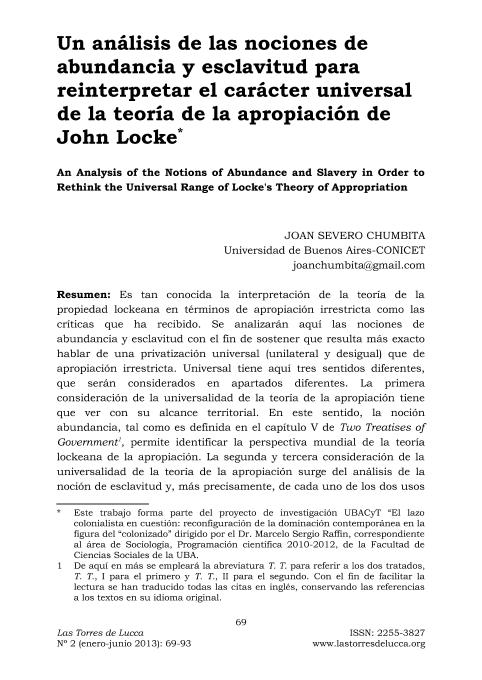Mostrar el registro sencillo del ítem
dc.contributor.author
Chumbita y Gamba, Joan Severo

dc.date.available
2017-01-27T21:34:34Z
dc.date.issued
2013-12
dc.identifier.citation
Chumbita y Gamba, Joan Severo; Un análisis de las nociones de abundancia y esclavitud para reinterpretar el carácter universal de la teoría de la apropiación de John Locke; Univ Complutense Madrid; Las Torres de Lucca. Revista Internacional de Filosofía Política; 2; 2; 12-2013; 69-83
dc.identifier.issn
2255-3827
dc.identifier.uri
http://hdl.handle.net/11336/12151
dc.description.abstract
Es tan conocida la interpretación de la teoría de la propiedad lockeana en términos de apropiación irrestricta como las críticas que ha recibido. Se analizarán aquí las nociones de abundancia y esclavitud con el fin de sostener que resulta más exacto hablar de una privatización universal (unilateral y desigual) que de apropiación irrestricta. Universal tiene aquí tres sentidos diferentes, que serán considerados en apartados diferentes. La primera consideración de la universalidad de la teoría de la apropiación tiene que ver con su alcance territorial. En este sentido, la noción abundancia, tal como es definida en el capítulo V de Two Treatises of Government1 , permite identificar la perspectiva mundial de la teoría lockeana de la apropiación. La segunda y tercera consideración de la universalidad de la teoría de la apropiación surge del análisis de la noción de esclavitud y, más precisamente, de cada uno de los dos usos del término que pueden distinguirse. El estudio de la esclavitud política, considerada ilegítima, nos permitirá explorar la relación paradójica que mantiene la teoría de la propiedad lockeana, en tanto universal, frente a los Estados particulares. Por último, la figura de esclavitud legítima, en cuanto apropiación del hombre, nos permitirá establecer la universalidad de la teoría de la apropiación en relación a su objeto, en tanto no se limita a los frutos y la tierra sino también a la vida humana.
dc.description.abstract
Lockean theory of property in terms of irrestricted appropriation is as widely known as the criticism that has been addressed to it. The notions of abundance and slavery will be discussed here to claim that it is more accurate to talk about universal privatization (unilateral and unequal) than to talk about irrestricted appropriation. "Universal" has here three different meanings, which will be considered in different sections. The first meaning of "universality" within the theory of appropriation is related to its territorial scope. In this regard, the notion of abundance as defined in Chapter V of Locke's Two Treatises of Government identifies the global perspective of the Lockean theory of appropriation. The second and third meanings arise from an analysis of the notion of slavery, and more precisely from both uses of the term. The study of political slavery, considered as illegitimate, will allow us to explore the paradoxical relation between Lockean theory of property (as universal) and particular states. Lastly, the notion of legitimate slavery (the appropriation of human beings) will allow us to establish the universality of the theory of appropriation and its object, not just concerning earth and fruits but human life too.
dc.format
application/pdf
dc.language.iso
spa
dc.publisher
Univ Complutense Madrid

dc.rights
info:eu-repo/semantics/openAccess
dc.rights.uri
https://creativecommons.org/licenses/by-nc-sa/2.5/ar/
dc.subject
Locke
dc.subject
Teoría de La Propiedad
dc.subject
Abundancia
dc.subject
Esclavitud
dc.subject
América
dc.subject.classification
Otras Filosofía, Étnica y Religión

dc.subject.classification
Filosofía, Ética y Religión

dc.subject.classification
HUMANIDADES

dc.title
Un análisis de las nociones de abundancia y esclavitud para reinterpretar el carácter universal de la teoría de la apropiación de John Locke
dc.title
An Analysis of the Notions of Abundance and Slavery in Order to Rethink the Universal Range of Locke's Theory of Appropriation
dc.type
info:eu-repo/semantics/article
dc.type
info:ar-repo/semantics/artículo
dc.type
info:eu-repo/semantics/publishedVersion
dc.date.updated
2017-01-27T13:28:06Z
dc.journal.volume
2
dc.journal.number
2
dc.journal.pagination
69-83
dc.journal.pais
España

dc.journal.ciudad
Madrid
dc.description.fil
Fil: Chumbita y Gamba, Joan Severo. Consejo Nacional de Investigaciones Científicas y Técnicas; Argentina. Universidad de Buenos Aires; Argentina
dc.journal.title
Las Torres de Lucca. Revista Internacional de Filosofía Política
dc.relation.alternativeid
info:eu-repo/semantics/altIdentifier/url/http://www.lastorresdelucca.org/index.php/ojs/article/view/31
Archivos asociados
